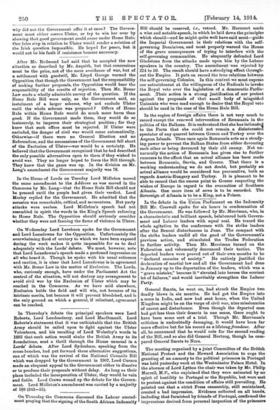After Mr. Redmond had said that he accepted the new
situation as described by Mr. Asquith, but that concessions must be the price, not of the mere avoidance of war, but of a settlement with goodwill, Mr. Lloyd George warned the Opposition that though the Government bad the responsibility of making further proposals, the Opposition would bear the responsibility of the results of rejection. Then Mr. Boner Law made a wholly admirable survey of the question. If the Home Rule Bill were only, as the Government said, an instalment of a larger scheme, why not exclude Ulster until the whole scheme was prepared P Offers of Home Rule within Home Rule would do much more harm than good. If the Government made them, they would do so insincerely, to improve their strategical position ; for they knew that such offers must be rejected. If Ulster were excluded, the danger of civil war would cease automatically. Otherwise—if there were no General Election and no Referendum, and the concessions of the Government fell short of the Exclusion of Ulster—war would be a certainty. He believed that the Government recognized that he bad described the only possible alternatives open to them if they wished to avoid war. They no longer hoped to force the Bill through. They knew that the game was up. In the division on Mr. Long's amendment the Government majority was 78.






































 Previous page
Previous page